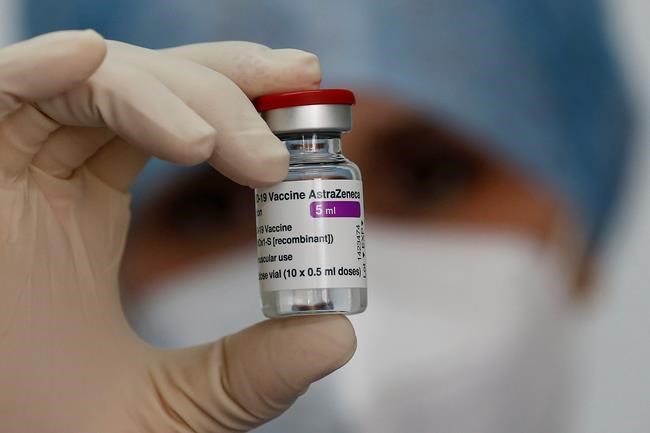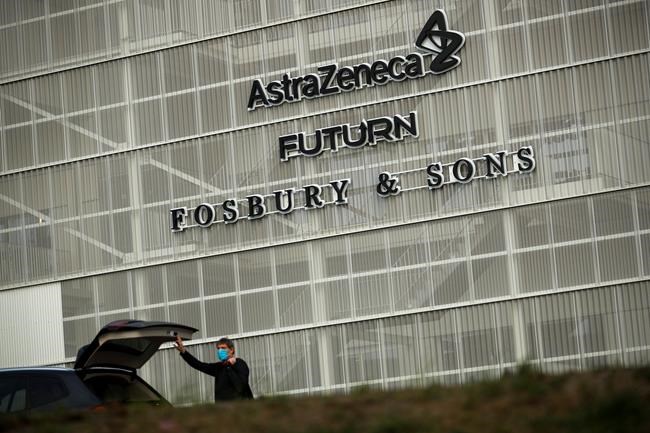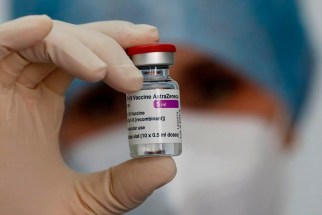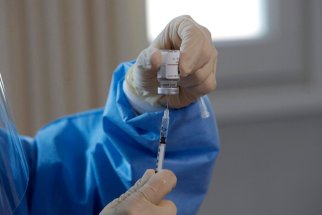Health Canada approves AstraZeneca’s COVID-19 vaccine
Read this article for free:
or
Already have an account? Log in here »
To continue reading, please subscribe:
Monthly Digital Subscription
$0 for the first 4 weeks*
- Enjoy unlimited reading on winnipegfreepress.com
- Read the E-Edition, our digital replica newspaper
- Access News Break, our award-winning app
- Play interactive puzzles
*No charge for 4 weeks then price increases to the regular rate of $19.00 plus GST every four weeks. Offer available to new and qualified returning subscribers only. Cancel any time.
Monthly Digital Subscription
$4.75/week*
- Enjoy unlimited reading on winnipegfreepress.com
- Read the E-Edition, our digital replica newspaper
- Access News Break, our award-winning app
- Play interactive puzzles
*Billed as $19 plus GST every four weeks. Cancel any time.
To continue reading, please subscribe:
Add Free Press access to your Brandon Sun subscription for only an additional
$1 for the first 4 weeks*
*Your next subscription payment will increase by $1.00 and you will be charged $16.99 plus GST for four weeks. After four weeks, your payment will increase to $23.99 plus GST every four weeks.
Read unlimited articles for free today:
or
Already have an account? Log in here »
Hey there, time traveller!
This article was published 26/02/2021 (1745 days ago), so information in it may no longer be current.
OTTAWA – Health Canada decided Friday to authorize the AstraZeneca vaccine and the first half million doses of it will be shipped to Canada next week.
The regulatory team reviewing COVID-19 vaccines said the one by AstraZeneca is both safe and effective and can be used immediately on people over the age of 18.
“This is very encouraging news,” said Prime Minister Justin Trudeau. “It means more people vaccinated, and sooner.”
“This is very encouraging news. It means more people vaccinated, and sooner.”–Prime Minister Justin Trudeau
AstraZeneca joins the Pfizer-BioNTech and Moderna vaccines on the list of those authorized in Canada. Clinical trials showed it to be less effective at preventing infection than the first two, but it is still keeping people from getting very sick or dying, said Dr. Supriya Sharma, the chief medical adviser at Health Canada.
Pfizer and Moderna both reported being 95 per cent effective at preventing COVID-19 infections in patients who received the vaccine, compared to those who received a placebo. AstraZeneca was 62 per cent effective.
But Sharma said the “key numbers” to examine when looking at all the vaccines Canada has approved or is reviewing is whether they prevented serious illness and death.
“If you look across all the clinical trials of the tens of thousands of people that were involved, the number of cases of people that died from COVID-19, that got vaccine was zero,” she said.
“The number of people that were hospitalized because their COVID-19 disease was so severe was zero. The number of people that died because of an adverse event or an effect of the vaccine was zero.”

It’s not entirely clear yet how provinces and territories will incorporate the AstraZeneca vaccine into their vaccination programs, but because it is can be shipped and stored in refrigerators instead of freezers, it is a more flexible option.
Sharma said AstraZeneca’s review process included not only the clinical trial data submitted by the company but also evidence of how the vaccine has been working in the real world. Millions of people in more than 50 countries have now received the vaccine since it was first approved at the end of December.
AstraZeneca Q&A
Questions and answers about the AstraZeneca vaccine:
• Why did it take so long to approve?
• How effective was the vaccine in clinical trials?
• Does it work against the new variants?
• How does the vaccine work?
• What are the advantages to this vaccine?
• When can we expect a rollout to begin in Canada?
Here’s what we know about the AstraZeneca product:
Why did it take so long to approve?
Health Canada’s regulatory team had been reviewing AstraZeneca’s application since Oct. 1, 2020, and was undergoing its final assessment of clinical data as of late last month.
Dr. Supriya Sharma, Health Canada’s chief medical adviser, said in January the review was “a bit more complicated’’ because some volunteers in AstraZeneca’s trials only received a half dose at first.
How effective was the vaccine in clinical trials?
Data released by the company suggested the vaccine was 62 per cent effective in clinical trials when two full doses were distributed a month apart. Another dosing regimen, where a half dose was followed by a full dose 28 days later, was shown in interim data to be 90 per cent effective.
Sharma says the recommendations are to administer two shots with the same dosage amount four to 12 weeks apart. She added there was some limited data suggesting a better immune response was observed when the second dose was given closer to the 12-week range.
AstraZeneca’s efficacy compares with the 95 per cent efficacy from the clinical trials of Pfizer-BioNTech and Moderna, the other two vaccines currently approved in Canada.
Preliminary results from AstraZeneca’s trial were reviewed early on by The Lancet medical journal, which suggested the vaccine can reduce spread of the virus as well as protect against illness and death.
Health Canada says that while the vaccine was not tested on people over the age of 65, real-world data from countries already using the product suggest it is safe and effective among older age groups.
Sharma noted that while the efficacy ranged with the three approved vaccines, all of them saw zero hospitalizations and deaths in those who got COVID after getting the vaccine.
Does it work against the new variants?
A group of experts on immunization working with the World Health Organization is recommending the use of AstraZeneca’s vaccine, even in countries where variants emerged as dominant.
That guidance comes after a small study in South Africa suggested AstraZeneca’s vaccine was only minimally effective against the variant first detected there, causing the country to halt use of the product earlier this month.
South Africa said it would instead give the still-unapproved Johnson and Johnson vaccine to front-line health workers to see how it protects against the more contagious variant that’s dominant there.
Oxford University, who helped develop the AstraZeneca vaccine, has said researchers were tweaking their product by inserting a genetic sequence from that specific variant.
AstraZeneca’s vaccine has some promising early data suggesting it works against another variant first detected in the U.K. Findings based on swabs taken from around 500 volunteers in trials between October and January showed a 74.6 per cent efficacy rate against that variant.
How does the vaccine work?
Unlike Pfizer-BioNTech and Moderna, which use messenger RNA (mRNA), the Oxford-AstraZeneca vaccine is a non-replicating viral vector, using a weakened chimpanzee cold virus as a vessel.
Scientists stripped the genes from that virus, which isn’t harmful to humans, and replaced them with the spike protein gene for SARS-CoV-2.
Once injected, the vaccine shows our bodies how to produce the immune response needed to ward off future infections from the COVID-19 virus.
Non-replicating means the virus won’t actually reproduce throughout the body.
What are the advantages to this vaccine?
Oxford-AstraZeneca can be shipped and stored at regular refrigerator temperature, unlike Pfizer-BioNTech which requires ultra-low freezers to hold its product before it’s injected. Moderna’s vaccine is somewhere in the middle, needing a regular freezer to keep the injections at about minus 20 C.
From a global vaccination standpoint, the low cost of AstraZeneca’s vaccine — about US$4 per dose — gives it another advantage. AstraZeneca, which says it aims to manufacture up to three billion doses in 2021, has pledged to make their product available at cost around the world until at least July.
The AstraZeneca vaccine forms the bulk of the stockpile acquired so far by the U.N.-backed vaccine-sharing effort known as COVAX, which aims to deploy coronavirus vaccines to people globally.
When can we expect a rollout to begin in Canada?
The Canadian government has already procured 20 million doses of the Oxford-AstraZeneca vaccine and a rollout can be expected to begin shortly after the first shipments arrive in the country.
Canada will also receive up to 1.9 million doses of the AstraZeneca vaccine through COVAX by the end of June.
Prime Minister Justin Trudeau said in early February he believes most of those 20 million doses — enough to inoculate 10 million people — will be delivered before Canada Day.
The government has said it plans to vaccinate the majority of Canadians by September.
– The Canadian Press, with files from The Associated Press
Canada anticipated getting enough vaccine from Pfizer-BioNTech and Moderna to vaccinate three million people by the end of March, 14.5 million people by the end of June, and all 38 million Canadians by the end of September.
The addition of AstraZeneca should quicken that pace.
Canada is getting 24 million doses by September, and as many as one million by the end of March. That includes 20 million directly from AstraZeneca, and made in the United States, between April and September. Another 1.9 million doses made in South Korea and delivered via the vaccine sharing initiative known as COVAX are to come by the end of June, and the first 500,000 of those could be delivered in the next month.
Procurement Minister Anita Anand also said a deal to get another two million doses from the Serum Institute of India was finalized Thursday. Verity Pharmaceuticals, which is facilitating the Serum Institute’s application in Canada, said Friday the first 500,000 will come next week, followed by one million in mid-April, and the rest in early May.
AstraZeneca vaccines are to be given in two doses between four and 12 weeks apart. Sharma said there is some indication that waiting longer provokes a better response, but that data is not yet complete.
There have been some concerns raised about the AstraZeneca vaccine in recent weeks, including how well it works against variants and whether there is enough data to show it works on older individuals.
Several European countries, including Germany and France, limited AstraZeneca to people under the age of 65. Sharma said there were a limited number of people over 65 involved in the clinical trials, but that data, coupled with the real-world experience in the United Kingdom, shows strong evidence seniors are protected.
“When we do the authorization, the question is, for somebody 65 years of age and older, with the benefits of getting the vaccine versus not getting the vaccine, would the benefits outweigh the risk,” she said. “And the answer to that was yes based on all the information that we have.
The National Advisory Committee on Immunization will issue guidance for how best to use the vaccine in the next few days, said Sharma. Provinces can then determine how they will incorporate it into their planning.
Canada’s vaccine program is shifting into a higher gear after a month-long slowdown in deliveries due to production issues for Pfizer and Moderna. More than 300,000 people were vaccinated in the last week, almost one-fifth of the total doses injected since the first vaccinations began Dec. 14.
As of Friday afternoon about 700,000 people have received one dose and more than 500,000 are now fully vaccinated with two doses.

The AstraZeneca vaccine works differently than the other two already in use in Canada.
Both Pfizer-BioNTech and Moderna use messenger RNA technology, using RNA encoded with the piece of the SARS-CoV-2 virus known as the spike protein. The mRNA trains the body to fight off a COVID-19 infection.
AstraZeneca is a viral vector vaccine, which takes a cold virus, modifies it so it can’t reproduce itself, and adds the SARS-CoV-2 spike protein. When injected, it too provokes the body to develop infection-fighting antibodies and cells to fight the virus.
The U.S. Food and Drug Administration was meeting Friday to decide whether to authorize the vaccine from Johnson and Johnson, and Sharma said Health Canada was expecting some final data on manufacturing from that company Friday.
An approval for it could soon follow.
A fifth vaccine from Novavax expects to report clinical trial data in April, paving the way for Health Canada to make a decision about it this spring.
Those two vaccines would add another 62 million doses to Canada’s supply.
History
Updated on Friday, February 26, 2021 11:14 AM CST: Corrects typo











